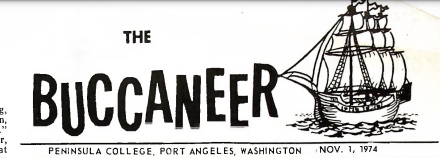
Ban on log exports could cut down state school funding
A proposed ban on log exports
could cut $2.15 million out of
state funding for education,
according to Ralph Munroe,
campaign manager of Ludlow
Kramer, Third District
Congressional candidate.
Munroe appeared with other
candidates Mon., Oct. 21, at the
Senior Citizens Center.
Don Bonker (Democrat),
opposing Kramer, supports a
log export ban which he
believes will save jobs in the
logging industry. William
Gellor Jr., of Port Angeles,
represented Bonker.
School funding is also the
concern of Irene Conca,
challenging Charles Savage,
incumbent Democrat, for the
office of State Legislature
Position 2. Conca said she
doubted that local school boards
could retain control of public
schools if full state funding is
initiated.
Savage claimed the state has
no desire to run public schools;
and is not concerned about local
school boards losing control as a
result of legislative funding
measures.
Paul Conner, Democrat
incumbent state legislator, and
H. W. “Skip” Barron, of the
Libertarian Party, running for
Position 1, expressed their
political philosophies, avoiding
specific ballot issues.
Barron summarized the
Libertarian ideology by stating
that “initiation of force is a
crime.” Taking a stand against
government intervention in
invididuals’ lives, Barron said
he opposes the state graduated
income tax, state land use bills,
and zoning laws restricting
personal use property.
Barron also opposes laws
restricting abortion, saying,
“Abortion is between a woman,
her doctor and her conscience.”
Representing Paul Conner,
James Hughes said that
Conner’s record in state politics
proves his dedication to public
service.
State Supreme Court
candidate Liem Tuai
emphasized his down-to-earth
political style characterizing
opponent Charles Horowitz as
having an “ivory tower
complex.”
Speaking for Horowitz,
attorney Stanley Taylor
endorsed Horowitz as being the
most qualified candidate for the
State Supreme Court position.
Horowitz has previously been
elected twice to the Washington
State Court of Appeals.
D.J. Caulkins, running for reelection as county
commissioner, is opposed by
Evelyn B. Tinkham. Both
candidates sparked frequently
questioning from the audience.
Caulkins defended his past
record as commissioner and
stated his opposition to a plan to
expand the present threemember board of commissioners to five members.
members.
Tinkham favors the
expansion but said she would
like more citizen input before
making a final decision.
Unopposed candidates
present at Monday’s meeting
were Lester Lancaster, county
assessor, Robert Clark, county
treasurer, Alice C. Thorne,
county auditor, and Harley
Bishop, sheriff.
The meeting was sponsored
jointly by the League of Women
Voters, the American
Association of University
Women and The Daily News.
BOC approves elections amid allegations
The four members of the BOC
voted unanimously to approve
the fall quarter elections of
class representatives amid
controversy and allegations of
an illegal election, during their
regular meeting Tuesday, Oct.
22.
President Tim Fryer called
for a vote as Jeff Pope, John
Fors and Kathy Feakes
approved the elections.
The controversy and
allegations stemmed from two
questions concerning the
legality of the elections as
spelled out in the constitution.
According to Article VI
Section S’of the constitution the
election of the remaining voting members of the BOC and Pep
Squad shall be conducted’no
later than the third Friday of
fall quarter, or in this case Oct.11. However, the final run-off
election of sophomore
representative was held Oct. 18.
The other major question was
a case of interpretation. In the
elections held, sophomores
were allowed to vote for
sophomores only; freshmen for
freshmen. However, nothing in
the constitution says that
sophomores can’t vote for
freshmen and vice versa.
Article VI Section 5 simply says
“All Associated Student
members are eligible to vote.”
Following the official
statement in writing, by Jim
Lunt, informing the board of the
problem, the BOC officers and
“elected” representatives
proceeded to debate the issue.
During the course of the
debate, validation,
impeachment, resignation and
amendment were words used
frequently in attempting to
come to a solution.
Steve Kimball and Jerome
Eberharter, sophomore class
representatives, seemed to
think the election should be
declared illegal and run over
again, along with a
constitutional amendment.
But Kara Slehofer, freshmen
representative said that the
election should be approved and
business returned as usual.
Jeff Pope, BOC vice
president, said he had
considered stepping down from
office as he was in charge of the
election, but felt that it would
not solve anything. Noting that
no other alternative was
feasible at present, Jeff moved
that the BOC approve the ASB
fall quarter elections. The
motion carried and was passed.
Steve Kimball then said he’d
resign under such conditions,
and a lengthy debate started
between Kimball, Eberharter,
and Brian Murphy (the
remaining sophomore
representative) as to why a
resignation was not the answer.
Kimball and Eberharter
reached a consensus,
eventually agreeing with the
board’s decision, although still
contending the election illegal,
and the hour and fifteen minute
discussion was ended.
The board then decided to
hold a continuation of the
meeting Wednesday evening at
6 in the PUB.
Before adjourning the
Tuesday meeting the “board
heard from Jeff Pope on the
costume dance expenses, and
President Fryer discussed his
committees and other
appointive offices. A list of his
appointments should be made
known by the next BOC
meeting.
Wednesday night the board
approved an allotment of not
more than $100 for expenses for
the jam session on Nov. 15.
Jerome Eberharter discussed
the possibility of having a ping
pong table for use in the PUB.
The topic will be looked into.
Meetings will be held every
other Tuesday noon in the board
room.
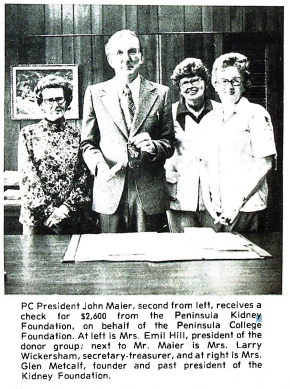
Kramer speaks to students
A. Ludlow Kramer, U.S.
Congressional candidate from
the Third District, spoke to
students of Dr. Werner Quast’s
classes during a visit to Port
Angeles and Peninsula College
Thursday, Oct. 24.
Kramer spoke on the political
process, changes in Congress,
political parties, public
disclosure laws, and the
financialfuture of Port Angeles.
Kramer said he feels
Congress should adopt a public
disclosure law. “(Initiative) 276
has become a workable tool,”
Kramer said. He said he also
feels that Congress should limit
campaign spending. However,
his greatest fearisthat the limit
would be set so low that only the
incumbent would be able to win
on the money allowed.
Speaking of this area’s
commerce, Kramer said he
would exclude Port Angeles as
an oil transport or refining
area, and instead aim toward
adopting aquaculture or related
industries.
Kramer strongly disagrees
with opponent Don Bonker’s
stand on log exports. He says
that Bonker’s stop-export policy
would just cause fewer jobs,
no one to sell the finished
product to. They key lies in
house starts, according to
Kramer.
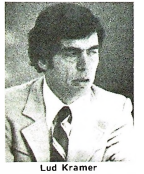
Kidney foundation donates to PC
The Peninsula Kidney
Foundation, represented by
Mrs. Glenn Metcalf, Mrs. Emil
Hill, and Mrs. Larry
Wickersham, presented a check
for $2,600 to the Peninsula
College Foundation, Tuesday,
Oct. 21.
The money will be used
specifically for the training of
nurses in the dialysis program.
A dislysis machine is a portable
kidney apparatus.
Until recently, kidney
patients had to go to Seattle to
receive treatment. But with the
invention of the portable
machine, and support from
Social Security, the Foundation
felt that it was no longer
needed. However, the members
of the Foundation thought that
the money should be used
locally, and that more trained
people would be needed.
Editorial
Vote; but wisely
In these post-Watergate days, people are urging
each other to be more knowledgeable concerning
politics and politicians. Let us not take these urgings
too lightly.
The only way to prevent such occurrences from
happening again is to become aware of our political
system, as well as its integral units, the elected
officials.
There are many paths open for exploration in the
search for facts about your government. Start with the
various forms of mass media.
Radio and television have the capability to report
the news quickly, but in little depth. Newspapers, on
the other hand, aren’t speedy, but they can go into
greater detail. Newspapers can print entire texts of
important speeches or key legislation which can be
studied repeatedly at the leisure of the individual.
Other sources of information are the official voters’
pamphlet published each year by the secretary of
state, and campaign brochures distributed by the
candidates. Of course, these brochures must be taken
in the proper context because of their staunchly biased
views.
In this election year, the cry is not only to get out and
vote, but if you do vote, know what you’re doing. With
all these avenues of information open to us, there is no
excuse for blind voting. An informed public will get rid
of such damaging voting procedures as straight-party
voting, voting out all incumbents, or voting for a
candidate because he has an interesting name.
Get out and vote. Vote wisely, and above all,
independently.
— Ed Mund
Letters to the editor
Writer objects to headline
Thank you for printing my
letter in the Oct. 4 issue of the
Buccaneer.
However I protest your use of
the title “Yankee Go Home”
because I feel this is a
misrepresentation of my views.
In no place did I state either
explicitly or implicitly that
American presence should be
removed from the Philippines. I
simply pointed out the
inequities of the situation from
the Filipino perspective.
Pointing out the unpalatable
realities pertaining to the U.S.
military bases is my attempt at
improving relations between
our two countries, hoping that
we may never come to the point
where we have to express
ourselves in hateful slogans. I
feel that your inaccurate
labeling of my article has
effectively prevented many
people from taking my views
with any seriousness or
openness, blocking the way to
communication and
understanding. Furthermore, it
has as much as labeled me
“anti-American,” putting a
blight on the friendships I have
on campus.
Please allow me to clarify the
fact that I have taken issue with
U.S. foreign policy and not with
the American people. In these
post-Watergate days it should
be obvious to everyone that
there is a difference between
what the people think or want
and what the government is
doing, or says it is doing. Indeed
I am confident that the
American people would not
stand for all that is being done
in their name if they knew half
of what it was.
Susan Monte de Ramos
Soldwisch
Car pools wanted
Announcement of rides
needed for two handicapped
students brought immediate
response in Mrs. Perry’s class.
Perhaps a car pool center would
be a help to other students as
long walks get colder and
wetter, or as money for gas and
the gas itself seems to be in
shorter supply.
Those who would be
interested in sharing
transportation to and from
campus are encouraged to
leave name, address, telephone
number, and traveling hours
with Mrs. Spillane to determine
possible interest in a share-aride center.
Briefs
“Fritz the Cat,” cancelled at
Pacific Lutheran University a
few weeks ago because of its
questionability, may get a
second chance if enough
interest is shown by the student
body.
Withdrawn by the movie
committee prior to its original
scheduled showing, there have
been requests for the return of
the film and if 120 signatures
can be obtained, Fritz may be
back.
Library Corner
The library has acquired
several new sports magazines
for your reading pleasure.
Golf enthusiasts will enjoy
reading Golf Magazine and Golf
Digest.
Golf Magazine is basic
reading for the dedicated fan. It
offers tips and suggestions for
handling all types of golfing
situations and difficulties,
answers questions on
techniques, tactics and rules of
the game. Among the
contributors are Gene Sarazen
and Oscar Fraley.
Golf Digest is written and
edited for the beginning and
professional golfer. It contains
detailed and thorough
instruction in good golfing
principles and techniques from
professionals such as Snead,
Nelson and Casper. Also
featured are informative
articles highlighting profiles of
promising and established
golfing personalities,
interesting and unusual golfing
situations and feats, records,
predictions and biographies.
For the tennis player as well
as the fan, Tennis Illustrated is
a popular monthly magazine
containing feature articles
about tennis greats, hints on the
game, and tournament
highlights throughout the world.
Also included are entertaining
articles, cartoons, crossword
puzzles, recipes, health hints,
and tips on new tennis products.
Chess Life & Review,
subtitled “The World’s Largest
Chess Magazine,” has wide
appeal for just about anyone,
regardless of age or experience,
who isinterested in the game. It
covers both tournament and
correspondence chess,
presenting international,
regional, and interstate
activities.
Get Out of My Light
What is radicalism?
By STEVEN D. KIMBALL
One important question facing any individual or group of
individuals wishing to advocate a position in the intellectual
war of ideas is what kind of calling card to use. From what
point of view does the movement see itself and how does it
describe itself to the audience toward whom it directs its
actions?
When people are tired of existing institutions and seek
relief from their oppressiveness the word “radical” often
strikes a sympathetic cord. Radical is defined as “tending or
disposed to make extreme changes in existing views, habits,
conditions, or institutions.” Radicalism is thus identified
with new, very different solutions to problems.
The radical’s counterpart is the reactionary. Reaction is
defined as “tendency toward a former especially outmoded
political or social order or policy.” A reactionary then is one
who advocates change, but rather than progressive change it
is a return to already tried policies and programs.
In any intellectual battle to determine a new social course
the radical is always at the advantage if he can show his
opponent to be advocating a system of ideas which have been
proven to be outmoded. Once this is shown, the opponent is
labeled reactionary and consigned to the historical dustbin of
social movements.
So far so good, but a problem arises when the names are
mixed, when a reactionary group usurpsthe radical title and,
attacking its opponents as reactionaries, uses the social
stigma of the label to destroy them. This is the present status
of the term radical.
The history of the world has been one of oppression,
brought about by one group’s desire to impose its wishes on
the rest of the populace. This has generally occurred by
seizing the reins of the state, passing the laws one wants and
then labeling one’s opponents as heretics, genetic inferiors,
or simply anti-social and opposed to the public welfare. This
tactic has been used by kings, emperors, fuhrers, people’s
commissars, and democratic presidents and representaives. All of these individuals have used the power of the state to force their ideas on everyone else. The result has been
wars, slavery, censorship, destruction of civil liberties, taxation and expropriation.
What follows from this is that anyone who advocates a philosophy based on control of other individuals, whether they be blacks or whites, women, or men, workers or capitalists is advocating the most reactionary philosophy possible. Our modern lexicon of fascits,socialists, communists, welfare statistics and other assorted collectives are the reactionaries, parading under the banner of radicalism.
There can be only one Radical position and that is the one which stands clearly for human freedom. Freedom in its truest sense is
the one thing the world has always lacked and
the most radical of ideas. The lover of freedom is the only
u others are reactionaries in disguise.
Need for partisans elections
The following letter was
addressed to Tim Fryer,
president of ASB:
A short time ago I noticed that
only 134 students bothered to
vote for class representatives
on our campus. Generally
speaking, voter turnout in
student elections has been low
over the years. The student
council may wish to consider
the following suggestion.
Why not institute partisan
elections for student offices?
Students might not wish to run
as Republicans or Democrats,
but might be interested in filing
or being nominated as Wigs or
Radicals, Jeffersonians or
Hamiltonians, Nationalists or
Federalists, etc.
A system of partisan elections
might have the following
advantages: (1) Voter turnout
might be higher. (The turnout in
any partisan election is usually
much higher than for non
partisan contests.) (2) Students
could learn something about the
political process. (A partisan
political system requires
campaign chairmen, poll
watchers and campaign
workers. Nominations might be
made by a convention or by a
primary election. In either
case, students may have a
chance to grow between the
time of the nominations and the
general election.)
Thus, a system of partisan
elections could increase voter
turnout and make electing
student officers a learning
experience.
If there is any interest in this
proposal, I would be happy to
discuss it further with you or a
committee.
Richard E. Fisch, History
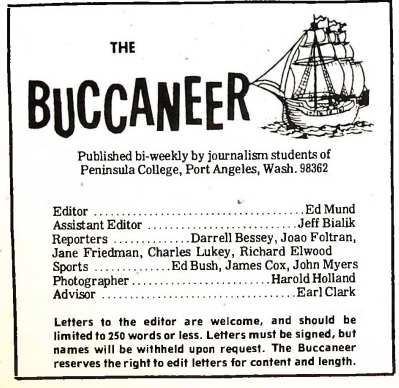
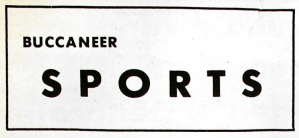
Intramural events
Intramural golf, billiards and
football came to a close for 1974
on Friday, Oct. 25, with a
special playoff game needed to
determine the champions for
football.
The two teams that finished
the 1974 season tied with
Thrills and Looney Bins, met
for this crucial game on Oct. 25.
At the end of the game when
regulation time had elapsed,
neitherteamhad scored a point,
and an overtime period was
needed.
This time period also
brought no score, but according
to regulations, the team that
accumulated the most yardage
was the winner. So the
intramural football
championship went to Big
Thrills.
Team members are Joe
Donley, Jerry Allen, Dean
Mclnnes, Charley Hartman,
Steve Kimball, Steve Pazan,
Doug Johnson and Tom
Langley. Each of these players
will receive an individual
trophy, as well as having his
name put on the perpetual
trophy in the showcase.
The 1974 football league
standings are as folloows:
W L
Big Thrills 6 1
Looney Bins 6 1
Huskies 5 2
Hams Infantry 4 3
Jolly Gobblers 3 4
Pathfinders 2 5
Firebreathers 1 6
7 French Diggers 0 7
The golf champion was
determined by the participant
who, after six attempts at 79
yards, hit the ball closest to the
pin. The 1974 champion was
Steve Marsch, whose shot was
10 feet away from the pin. The
billiards champion was Jim
Reandeau, who exhibited the
best skill in this event.
November 6 will be the last
day for those interested to sign
up for intramural basketball,
and Nov. 25 is the deadline for
the turkey trot sign-up. Winning
team members will share a 22-
pound turkey.
Any students wishing more
information on the intramural
program should see Jon
Livingston, chairman; or Art
Feiro, John Fors, Charles
Hartman, Dacy Caso and Dave
Haguewood, who make up the
Intramural Board.
Chance for bowling
Although not too much has
been heard on campus about it
yet, the chances are high that
Peninsula College will have a
bowling club again this year.
The club’s sponsor, Dr. John
Evans, says “I haven’t heard
too much from any students yet,
but interest probably will rise
with the arrival of colder
weather.” He also said the club
didn’t get going last year until
the winter quarter was in
progress, which might be the
case this year.
Whatever the case, student
participation is vital for the
success of the bowling club, and
members are needed.
Dangerous canines threat to students
By CHUCK LUKEY
Who knows what evil lurks in
the heart of a dog? The
Shadow? Gerald Ford? I’m not
sure, but I don’t. The other day I
was dashing around campus on
one of my missions when I was
confronted by a large, smiling
German Shepherd. I have met
this dog before and we even
shared a bologna sandwich the
previous week.
As I left the administration building that held my previous objective I spotted the dog sitting by the door so I asked him if he had seen Ernie lately, and I told him the no one was inside so he might as well go home.
He thought it over, and
replied by barking loudly and
lunging at my throat with
incredible speed. Realizing that
my life was atstake, I leaped to
the top of a dividing wall, and
tried to reason with the beast.
Sure, maybe he was getting
revenge for the bologna
sandwich, but did he have to
tear my new jeans?
Rin Tin Tin finally left the
scene to prey on somebody else,
and I slid down the wall to
safety.
Do we, the people of PC,
really need dogs hanging
around?
Thisstory could have a tragic
ending if the same thing had
happened to a Ms. or a senior
citizen student. I have had dogs
all of my life and none of them
ever tried to tear out my vocal
chords or rip off my leg.
Later on I realized that if that
dog had managed to grab me I
would have never gotten
another parking ticket, or eaten
another cinnamon roll again!
I’m sure that if a suit were
filed against the college after
another incident like this, there
would be no animals on campus.
I would like to be able to’ walk to
class without fear of attack.
How do other students feel
about dogs on campus?
PC girls win first
Peninsula’s girls volleyball
team tallied its first victory of
the season in beating a team
from Centralia Community
College two out of three games. The first game resembled
previous efforts by Peninsula
girls to come from behind to
win. With the score 14 to 4 in
favor of Centralia, the Pirates,
behind the hustle and
encouragement of Chris
Anderson and good serving
from Rhonda Reno, managed to
pull within two points, 14-12. But
when Centralia retained the
serve, they squeaked one past
the Peninsula defense to win 15-
12.
As in the first contest,
Centralia in the second game
built a substantial lead early 13-6. But this was to be the last of
the scoring by Centralia.
Needing only two points to win,
the Trailblazers could not
penetrate the solid Pirate
defense.
On the other side of the net,
Peninsula was displaying some
fine overhead serves. Patti
Tuttle let loose with four pin
point serves for easy scores,
while getting a couple of good
spikes by Stacie Baker to end up
winning 13-15.
The third and final game was
exactly opposite to the previous
two. This time Peninsula
jumped to an early lead behind
11 sharp serves of Rhonda
Reno. By now the Pirates were
moving and going after the ball
that had seemed to elude them
earlier in the other two games.
They began to set the ball and
place it in the gaps of the
stunned Centralia defense.
With the help from the
referee’s calling numerous
carrying charges against the
Centralia Trailblazers,
Peninsula won the game 15-6.
With this win, it gave Peninsula
two out of three games in the
series and their first league win.
Scholarship winner at home in Iowa
The Elsie Wall Meyer
Scholarship of $600 is presented
each year to the student who
achieves the highest standing in
the class. This also includes
college-related activities and
outside interests. Last spring,
the faculty chose Sharon Van
Horn who is now attending the
University of Iowa.
Here is a letter she sent back
this week to the PC faculty:
“I would like to take this
opportunity to thank you for
choosing me as the recipient of
the Elsie Wall Meyer Memorial
Scholarship. I am deeply
grateful for this help with my
education. I would also like to
thank you for all of the other
help and encouragement so
many of you gave me which has
helped me get where I am.
“I strongly feel that the two
years I spent at Peninsula were
well spent; more so perhaps
than had I begun at a four-year
school. I see so many lower
classmen here who feel so lost
and depressed in lecture classes
of five and six hundred. I am
sure I gained much more in the
same courses when there was
more individual attention
available.
“Most of my classes now are
much smaller. By attending PC
I almost entirely avoided the
common nightmares of huge
lecture classes. It made me feel
a bit at home when I saw
several familar books on the
ISU Bookstore shelves:
Anatomy, Micro, Organic Chem
and Economics. From talking
to other people in my classes I
feel that I have an even more
solid background than had I
taken similar lower division
classes here.
“I am beginning to feel a little
more at home here, if that’s
what you’d call it. Iowa could
never replace the Northwest! I
do miss the mountains and
water, as Iowa has little to offer
in the way of scenery. The cold
atmosphere of a large
university is much different
from the friendliness of
Peninsula. .
“This quarter I am taking
biochemistry and lab, two foods
classes and labs (which are
terribly fascinating) and a child
development class. I lost very
few creditsin transferring and I
am not at all behind anyone who
began here as a freshman.
“Again my thanks for the
scholarship and for all the other
help you have given me with my
education.”
Campus sport scene
Change for the better
By ED BUSH
Coaching this year’s girls’ volleyball team for Peninsula is
Jennie Smith. She has introduced a new program of
volleyball to PC.
In past years, the girls would get togetherfor about an hour
and hit the ball over the net. This would be the extent of their
practice. It resembled a gossip circle more than a volleyball
team.
Not so this year. Miss Smith is utilizing this time to teach
the girls what the game is all about. The girls have no time
for social activities, during practice, and if gibberish from
the mouth does occur, Jennie letsthem know what she thinks
of it.
Miss Smith is young and has attended Seattle Pacific,
majoring in physical education. She is now picking up credits
at P.C. so she can return to S.P.C. and major in physical
therapy. She has had no previous coaching experience, but
seems to have an awareness of the game and how it should be
played.
She has introduced the overhead serve to the girls, which
was a major win factor in the game against Centralia. Jennie
stresses that the girls keep active and talk to help each other
out on the court.
Little things are what counts to Jennie. Girls run laps for
carrying the ball, eat well before the game, and if a girl
misses a practice the day before a game, she will not be
allowed to play in that game.
Until their first win, the girls were not allowed to call Miss
Smith coach, for she felt that she did not deserve to be called
coach until the girls got off on the right track.
Coach Smith and the girls have a long way to go, but every
practice they learn a little more, and each game they look a
little better.
Screening committee appointed by BOT
The Board of Trustees has
appointed a screening
committee to narrow down
applications for the position of
college president, to be vacated
by retiring E. John Maier July
1.
Those on the committee are
Carl H. Olsen, Helen Radke,
Boyd Rupp, Gail R. Stuart and
George P. Wood.
Ronald Crawford was elected
by the Faculty Association to
serve on the committee.
The board of trustees devised
a set of qualifications for
president that will be used in
narrowing down the applicants.
Applicants must have at least
three years of successful
administrative experience,
preferably in a community
college, and be able to run both
the educational and
administrative sides of the
college.
Educational requirements
are that the applicants have an
appropriate advanced degree or
experience which would justify
consideration. A doctorate is
preferred but not absolutely
required.
Applicants should obtain
application blanks from the
college, complete them and
submit a confidential reference
file and data. They must also
submit a letter of application
and any other information
which may be relevant.
All correspondence should be
mailed to Dorothy Taylor,
executive assistant.
Deadline for applications is
Jan. 15. The board hopes to
make a selection by about April
1.
‘Harold and Maude’ next PC movie
“Harold and Maude,”
directed by Hal Ashby and
produced by Colin Higgins and
Charles Mulvehill, will be
shown in the Little Theater,
Nov. 3 at 8 p.m.
Starring Ruth Gordon, Bud
Cort, Vivian Pickles, Cyril
Cuasack and Charles Tyner, it’s
a love story of a necrophiliac
teenager and an 80-year-old
lady. Their meeting and their
romance is a modern fairy tale
set aglow by some sharp and
fresh jabs at motherhood, the
military, psychiatry and
computer dating.
“Harold and Maude” makes
fun of suicide, mother love,
patriotic fervor, and funerals.
The humor is black slapstick,
which is about asfar as you can
go and still laugh. And yet, it
really is shock-funny,” says
Archer Winten, New York Post.
“Under Hal Ashby’s
direction, Cort is effective as
the blank young man. Vivian
Pickles is particularly amusing
as his unperturbed mother. The
rest of the cast is good, too, but
it’s Miss Gordon’s show. Her
performance is lively and
funny,” Ann Guarino, New
York Daily News.

Local broadcaster, doctoral candidate at Studium Generale
The Studium Generale lecture
program brought Charles
Herring Jr. to Peninsula
College Oct. 17.
Herring is the ownermanager of KAPY radio, and
his speech was entitled
“Broadcasting’s Triennial
Tribulations.” Herring’sspeech
was on the tribulations of
applying every three years to
the Federal Communication
Commission for a license to
engage in broadcasting.
The Oct. 24 Studium Generale
speaker was Susan J. Hekman.
Ms. Hekman, who recently
passed her examinations for a
doctor of philosophy degree at
the University of Washington,
started her undergraduate
career at Carleton College,
Northfield, Minn.
She graduated from Carleton
magna cum laude with
“distinction in government and
international relations” in 1971,
after having been abroad for
one year at John Hopkins
Institute Study at Bologna,
Italy.
She is a member of the
honorary Phi Beta Kappa, and
is presently a teaching assistant
in the Department of Political
Science at the UW, the
institution that granted Ms.
Hekman her master of arts
degree in 1973.
In recent years, while
working toward her Ph.D., Ms.
Hekman has been specializing
in history of political theory,
modern political theory,
comparative politics and
American political thought.
In Thursday’s lecture Ms.
Hekman talked about the notion
of justice as it relates to the
study of politics, and the role of
women in the academic world.
Immediately following Ms.
Hekman’s lecture, A. Ludlow
Kramer made an appearance in
the Little Theater. An attempt
was made to bring Mr. Kramer
and Don Bonker to the Little
Theater at the same time;
however because of the two
men’s busy schedule, the
attempt failed.
The Rabbi Raphael Levine,
well known as moderator of
KOMO’s Sunday program
“Challenge” spoke on “Unity in
Diversity: An American Ideal”
at the last Studium Generale
lecture, Oct. 31. Ross Maloney,
who was scheduled to speak,
gave up his time for Levine’s
lecture. He will be heard from
later, probably during the
winter quarter lecture series.
Clean air lovers will be
treated to a course on auto
emissions testing at Studium’s
next session Nov. 6. Douglas
Gilleland and several members
of his automotive class are
bringing an engine and an
emissions analyzer to the PC
stage. To insure good health,
the fumes from the engine will
be piped outside.
If you have missed a Studium
Generale lecture you can make
it up by attending a
performance of the Port
Angeles Symphony Orchestra
at the Senior High School,
Sunday, Nov. 3, at 3 p.m.
Student admission is $1. Get
your program signed by any
faculty member for proof of
attendance.
BOC appoints committee
Noting the problems faced by
the “inadequacies” and
“vagueness” of the present
Associated Student
Constitution, the BOC has set up
a constitution revision
committee to handle the rewrite
job.
Steve Kimball and Brian
Murphy were appointed cochairmen and will select their
committee from interested PC
students.
The constitution has come
under fire lately and was
recently challenged by the BOC.
Anyone interested in the
committee may see Steven
Kimball or Brian Murphy.
Symphony tickets on sale now
Season tickets for the coming
season of the Port Angeles
Symphony Orchestra are now
on sale through Marvin Pollard,
PC music director.
Adult season passes are on
sale for $6, a saving of $4 off
regular ticket prices. Student
and senior citizen passes are $3,
a saying of $2 for the five
scheduled concerts. An added
luxury for the season ticket
holder is the opportunity to
bring children for no additional
charge.
The concert season will begin
Sunday, Nov. 3, with a 3 p.m.
matinee. The remaining
concerts will be held Dec. 8,
Feb. 2, March 16 and April 25.
Arab student is business major
Abdulla I. Al-Dakheel is a 25-
year-old business major from
Al-Khobar, Saudi Arabia. This
is hisfirst year at Peninsula and
he is enjoying it immensely.
While many foreign students
are receiving some form of
government aid, Abudlla is
financing his education entirely
by himself. He worked for over
five years in his native country
in the Arabian-American Oil
Company to save enough money
to come here to pursue an
education.
“Abby” decided to attend
Peninsula mainly because of a
high recommendation from a
fellow countryman who also is
going to school here. He likes
the area with its mild climate
and mountains, and says it
reminds him of the western
province of Saudi Arabia.
Although having been here
only a short time, “Abby” has
adjusted well to the food,
customs, and lifestyle of the
U.S. He enjoys all types of food
and will eat almost anything
except pork, which is against
his Islamic religion. He has
found people in the U.S. to be
friendly and easy to get along
with. The language has
presented some problems
because of our inclination for
slang, thus making English a
difficult language for him to
learn.
The PC dormitory is the
temporary home for Abdulla
while he is pursuing his
education in Port Angeles. In
his spare time, Abdulla likes a
good game of soccer or a hike in
the hills surrounding the town.
He likes this area because there
is so much to see and do.
Abdulla plans to go on to a
four-year institution after
graduation, and eventually
obtain a master’s degree in
business.

